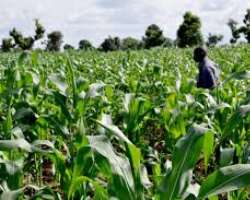THE ROLE OF AGRICULTURE IN HARNESSING NIGERIA'S ECONOMY

Agriculture involves the science, practice and occupation of
cultivating land and raising crops. It also involves the feeding
breeding and rising of livestock. The main purpose of agriculture is
to provide food and raw materials for human use. The fact that Nigeria
is richly blessed with abundant human and natural resources is one
point that has been consistently repeated in various forces. The
relatively divers climatic conditions in Nigeria makes it possible to
raise a wide range of crops across the country. The major crops grown
in economic quantities in Nigeria are beans, sesame, cashew nuts,
cassava, groundnut etc.
Nigeria is on its way to modern development. Branding itself as the
‘’giant of Africa’’, the country now needs to prove its potential by
raising its standards to a level with other fast developing economies
of the world. The agricultural sector in Nigeria is undoubtedly the
highest employer of labor, employing about 70percent of the Nigerian
labor force.
For decades, agriculture has been associated with production of
essential food crops. At present, agriculture above and beyond farming
includes forestry, dairy, fruit cultivation, poultry, beef keeping,
etc. Today, processing, marketing and distribution of crops and
livestock products etc. are all acknowledged as part of current
agriculture. Thus, agriculture could be referred to as the production,
processing, promotion and distribution agricultural products.
Agriculture plays a critical role in the entire life of a given
economy. Agriculture is the backbone of economic system of a given
country. In addition to providing food and raw material, agriculture
also provides employment opportunities to very large percentage of
population.
Approximately 70 % of the people directly rely on agriculture as a
mean of living. This high percentage in agriculture is as a result of
none development of non-agricultural activities to absorb the fast
growing population. However, most people in developed countries do not
engage in agriculture. Contribution to National revenue Agriculture is
the main source of national income for most developing countries.
However, for the developed countries, agriculture contributes a
smaller percentage to their national income. Supply of Food as well as
Fodder Agricultural sector provides fodder for domestic animals .Cow
provides people with milk which is a form of protective food.
Moreover, livestock also meets people’s food requirements.
Significance to the International Trade Agricultural products like
sugar, tea, rice, spices, tobacco, coffee etc. constitute the major
items of exports of countries that rely on agriculture. If there is
smooth development practice of agriculture, imports are reduced while
export increases considerably. This helps to reduce countries
unfavorable balance of payments as well as saving foreign exchange.
This amount may be well used to import other essential inputs,
machinery, raw material, and other infrastructure that is helpful for
the support of country’s economic development. Marketable Surplus The
growth of agricultural sector contributes to marketable surplus. Many
people engage in manufacturing, mining as well as other non-
agricultural sector as the nation develops.
Agriculture sector provides more employment opportunities to the labor
force that reduce the high rate of unemployment in the countries
caused by the fast growing population. Economic Development Since
agriculture employs many people it contributes to economic
development. As a result, the national income level as well as
people’s standard of living is improved. The fast rate of development
in agriculture sector offers progressive outlook as well as increased
motivation for development. Hence, it aids to create good atmosphere
for overall economic development of a country. Therefore, economic
development relies on the agricultural growth rate.
Source of Saving Development in agriculture may also increase savings.
The rich farmers we see today started saving particularly after green
revolution. This surplus quantity may be invested further in the
agriculture sector to develop the sector. Food Security a stable
agricultural sector ensures a nation of food security. The main
requirement of any country is food security. Food security prevents
malnourishment that has traditionally been believed to be one of the
major problems faced by the developing countries. Most countries rely
on agricultural products as well as associated industries for their
main source of income. Finally Nigeria would be leading the world in
food production if this huge workforce can be diverted towards
agriculture
SHUAIBU MUHAMMAD SHAMAKI,
A 300 LEVEL STUDENT,
MASS COMMUNICATION DEPARTMENT,
UNIVERSITY OF MAIDUGURI, BORNO STATE.
